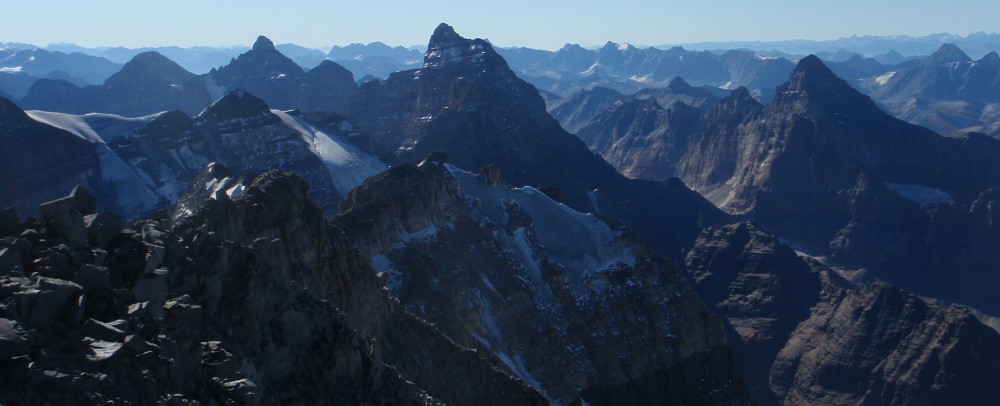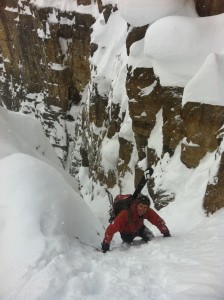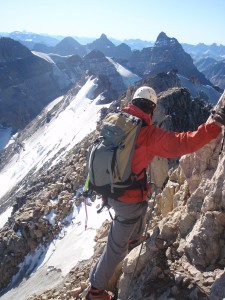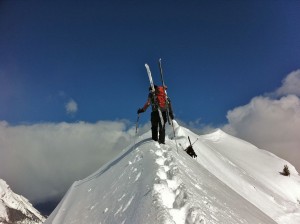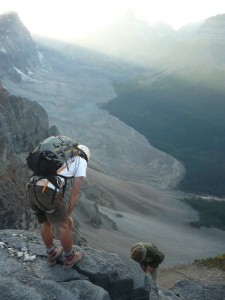In an essay written by Paulo Freire concerning the attributes that teachers must strive towards in order to become progressive teachers who aim to seek mastery of their practice, the author lists 7 qualities. Humility, lovingness, courage, tolerance, decisiveness, tension between patience and impatience, and a joy of living are the seven “indispensable qualities” (Freire, 71) he lists throughout his piece. Having fallen in love with the mountains, and taken the time to self-actualize and further my passion for life-long learning in the hills, I have strengthened the attributes that Freire mentions as being necessary for teachers to hone. Through writing and reflection I have come to understand how I built upon these attributes and how I was propelled towards becoming a teacher. As Eisner points out in an autobiographical piece of his own, “writing forces you to reflect in an organized and focused way on what it is you want to say. Words written confront you and give you the opportunity to think again.” (Eisner, 11) Through the process of thinking through my story, I have come to better understand how the mountains have shaped my desire to teach, and enabled me to strengthen the attributes Freire calls indispensable to a progressive teacher. What follows is that autobiographical account.
The mountains are where I’ve found direction, inspiration, clarity, passion and an unendingly humbled appreciation for life. Spending time climbing ridges, traversing crevasse-strewn ice-fields, and wandering through eco-regions of specialized magnificence, I have been confronted with questions that have shaped my thinking, and driven my desire to learn through inquiry. It has been amongst hanging glaciers, alpine meadows, sharp precipices, enumerable evergreens, and perfectly blue lakes where I have found a dedicated drive to understand why things are the way they are.
As I travelled through the Rockies in my early 20‘s, endless questions arose. How did the mountains form? How did Marmots survive the wintry apocalypse of ice and snow year after year? What anthropogenic causes have altered the state of ecological integrity in the area? Such questions sought scientific explanation, but often migrated into the hypothetical world of philosophy, and politics. Discussions around ecology and geology invariably led to conversations about existence. Understanding the precarious nature of ecosystems, and the drastic effects that warming temperatures have had on species in the montane, sub-alpine, and alpine eco-regions, conversation quickly fell into the mazes of political discourse and debate.
Through a passion for the mountains, I found an access point to wrestle with the perplexing issues of the modern world. With skis, climbing shoes and hiking boots, I traversed the terrain of my passions, and found a framework to make sense of the world around me. Inquiring into the nature of the mountain landscape, I found excitement and a progressively accelerating drive to understand not just about the hills, but about everything the imagination could conjure. Questions produced more questions than answers, and a state of perpetual inquiry resulted. With a found passion, I began to further develop as a life-long learner.
As I travelled through the hills with companions, I could not easily suppress my feverish delight with the seemingly perfect structure of the natural world. I pointed to the smallest lichen species, and the largest mountain features and felt an unstoppable urge to relate my knowledge-set to others. I wanted to articulate my passions and transform the way people thought about the mountains that we travelled through. I wanted people to feel the same sense of awe, wonder, and connection to the ecosystem and geography as I did. I wanted people to appreciate what I could understand.
Desiring a method to turn my leisure time activities into a lifestyle and career, I became a professional interpretive guide in the mountain parks, and began to guide weeklong hiking trips through the rockies. I turned my passion into a career, and reveled in the fact that my work day started with putting my hiking boots on.
As I entered the field of interpretive guiding, I had to learn how to effectively communicate information in an engaging and inclusive manner. This was a tall order, as the art of teaching is a practice that has no universal formula or silver-bullet, but I jumped in and surfaced some interesting insights about the profession along the way.
I had to find a way to interest people of all ages and activate their attention, focus and motivation to learn while on vacation. I found that every individual had different interests, and access points to stimulate meaningful conversation and understanding. Finding those points of entry to engage in purposeful and fulfilling dialogue represented my first pedagogical experimentation.
I applied my own experience as a learner, to find a way to communicate information in an engaging, understandable, and clear manner to my guests. I was motivated to learn when content appealed to my passions. My enthusiasm for the mountains led me to ask questions, and through inquiry about the environment around me, I was propelled into different areas of wonder. Finding where my guests passions lay, I was able to relate diverse content to them and harness their motivation to learn. Our passions would often weave together, and produce a shared sense of inquiry, leading to meaningful educational moments that were expansive and searching for both of us. As an interpretive guide, I found that I learnt as much from my guests as my guests did from me. They asked questions that propelled further investigation on my behalf, and continuously allowed me an opportunity to see the mountains that I loved through a new perspective and world-view. I came to understand learning and teaching as a social, interactive, multi-directional experience, that wasn’t linear, nor a matter of simply passing information from one source to another. Through appealing to the passions of the learner, and sharing my passions in an unguarded, genuine manner, powerful educational moments prevailed. Lighting the spark of inquiry through appealing to the interests of the learners led to pedagogically effective moments on the trail.
I taught guests about the symbiosis of the Clarks Nutcracker and the Whitebark Pine; the geological history of the sedimentary, icefield carved mountains; Park policy shifts from fire-suppression to prescribed-burns. Through appealing to each guests area of interest, and tailoring content accordingly, I was able to inject teachable moments to children and adults, alike. While talking to large groups of varying ages and different modes of learning, I learnt to show, tell, compare and use artifacts to communicate my message.
Through passionate, open-minded inquiry, and individualized, multimodal, interactive pedagogies, I found ways to be effective as a guide. As I brought these teaching methods from the trail into my first practicum classroom, I found that students were engaged, motivated and curious to explore content. Initially, I entered the classroom with the banking paradigm of teaching that I was schooled with as a student. I wasn’t sure if my methods from the mountains would translate into a more formal and regulated realm of teaching. As I experimented with pedagogies in class, I found that the spark of inquiry led students to more lofty academic heights. Pedagogies of inquiry allowed students room to maneuver within their own interests, and explore what excited them. As my passion for the mountains acted as a launch pad into diverse topics of learning, so too did students passions lead them into moments of expansive learning.
From my love of the mountains, I gained a sense of inquiry, that further distilled my passion for the hills. This led to a desire to share the ideas that I was enthusiastic about, and I became a guide. As I had success in this field, and came to enjoy the process of sharing information, I contemplated becoming a teacher, and entered the Bed program at UBC. From my initial experiences in the classroom, I have found rewards that have surpassed my expectations. My time on the trails have given me these insights into the art of teaching, and I am excited to engage, learn and constantly distill my practice into what I suspect will be a dynamic, exhilarating, and rewarding career.
Work Cited:
Friere, P. (1998). ‘Fourth Letter’ in Teachers as Cultural Workers: Letters To Those Who Dare Teach. Westview Press, pp71‐ 84
Eisner, Elliot. What the Arts Taught Me about Education: Art Education, Vol. 44, No. 5 (Sep., 1991), pp. 10-19
Comments From Guest Evaluations Guiding in the Rockies:
“Brennan blew everyone on this trip away with his amazing personality. He was the ultimate guide. His love for the outdoors is infectious. He has an amazing ability to relate to people. He can make easy conversation with everyone, from professionals to teens and even individuals with Asperger`s syndrome. He made sure that everyone`s needs were met. He has an incredible knowledge of the terrain of the Rockies. He can truly talk for hours about nature. We simply tried to soak up as much information as we could during our days with Brennan. Brennan`s personality, keenness, and love for people and the outdoors was truly something to behold. There are truly not enough wonderful adjectives to tell someone about his character. I hope you`re lucky enough to keep Brennan on your team for a few more seasons, but if he does end up becoming a teacher it really is going to be all those future students that are going to be the fortunate ones.” -2012
“Brennan loves the Canadian Rockies and has such a passion for nature, Canada, etc. He is such an expert on every mountain, animal, plant, etc. We loved learning from him, and his nurturing spirit & helpfullness was superb.” -2012
“Brennan is a very special person – he impacted me tremendously in a very positive way. His knowledge of the area was enlightening. He wants to be a teacher; he will be a very accomplished teacher and his students will be the better for it. I will remember him always!” -2012
“He was incredibly knowledgeable about EVERYTHING! He made it educational, but did so in a fun and accessible way. His passion for this was so apparent and incredibly contagious!” -2011
“Our family adored Brennan with his enthusiastic attitude and positive outlook. He played games with the kids, attended to our needs, encouraged us and made the experience perfect! My teenage boys really loved Brennan`s fun lovin` personality and he was so sweet to my eight year old daughter. He is smart, funny and interesting. Loved his guitar playing and singing! We couldn`t have asked for a better leader. “ 2012
“Brennan is a delight to spend time with. His easygoing manner, enthusiasm and knowledge makes him a wonderful trip leader. He was genuinely interested in the people on the trip, wanted to learn from them and has an amazingly wide range of knowledge.”
Both leaders were fantastic, but Brennan is the paradigm that you should try to model future leaders on. Brennan was incredibly knowledgable, entertaining, charming, and helpful. If you have a formal training course for leaders it would be prudent to let Brennan teach it. Could not have been better if you hired three leaders just to replace him.
Brennan was very enthusiastic and engaging, and certainly make the trip more enjoyable. His knowledge of the hikes and surrounding area was outstanding, and he was still smiling at the end of the week after all of our questions.
